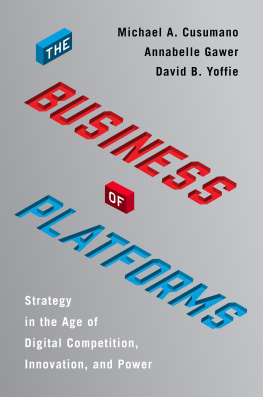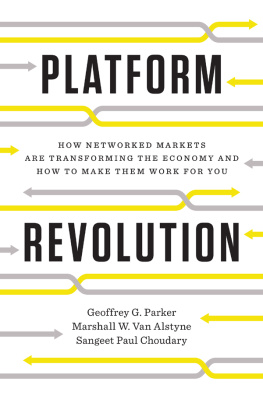Contents
Guide
Pages

Theory Redux
Series editor: Laurent de Sutter
Roberto Esposito, Persons and Things
Sreko Horvat, The Radicality of Love
Dominic Pettman, Infinite Distraction: Paying Attention to Social Media
Graham Harman, Immaterialism: Objects and Social Theory
Nick Srnicek, Platform Capitalism
Platform Capitalism
Nick Srnicek
polity
Copyright Nick Srnicek 2017
The right of Nick Srnicek to be identified as Author of this Work has been asserted in accordance with the UK Copyright, Designs and Patents Act 1988.
First published in 2017 by Polity Press
Polity Press
65 Bridge Street
Cambridge CB2 1UR, UK
Polity Press
350 Main Street
Malden, MA 02148, USA
All rights reserved. Except for the quotation of short passages for the purpose of criticism and review, no part of this publication may be reproduced, stored in a retrieval system, or transmitted, in any form or by any means, electronic, mechanical, photocopying, recording or otherwise, without the prior permission of the publisher.
ISBN-13: 978-1-5095-0490-9
A catalogue record for this book is available from the British Library.
Library of Congress Cataloging-in-Publication Data
Names: Srnicek, Nick, author. | De Sutter, Laurent, author.
Title: Platform capitalism / Nick Srnicek, Laurent de Sutter.
Description: Cambridge, UK ; Malden, MA : Polity Press, 2016. | Series:
Theory redux | Includes bibliographical references.
Identifiers: LCCN 2016023187 (print) | LCCN 2016036308 (ebook) | ISBN 9781509504862 (hardback) | ISBN 9781509504879 (pbk.) | ISBN 9781509504893 (Mobi) | ISBN 9781509504909 (Epub)
Subjects: LCSH: Information technology--Economic aspects. | Business enterprises. | Multi-sided platform businesses. | Capitalism--History. Classification: LCC HC79.I55 .S685 2016 (print) | LCC HC79.I55 (ebook) | DDC 330.12/209--dc23
LC record available at https://lccn.loc.gov/2016023187
The publisher has used its best endeavours to ensure that the URLs for external websites referred to in this book are correct and active at the time of going to press. However, the publisher has no responsibility for the websites and can make no guarantee that a site will remain live or that the content is or will remain appropriate.
Every effort has been made to trace all copyright holders, but if any have been inadvertently overlooked the publisher will be pleased to include any necessary credits in any subsequent reprint or edition.
For further information on Polity, visit our website: politybooks.com
Acknowledgements
A number of people have helped to bring this book to fruition. Thanks to Laurent de Sutter for initiating the project and to the team at Polity for bringing it all together George Owers, Neil de Cort, and Manuela Tecusan. Alex Andrews was an immensely helpful technical advisor, and thanks to everyone else who read earlier drafts Diann Bauer, Suhail Malik, Benedict Singleton, Keith Tilford, Alex Williams, and two anonymous reviewers. Last but not least, thanks to Helen Hester for supporting me and for always being my most intellectually challenging and insightful critic.
Introduction
We are told today that we are living in an age of massive transformation. Terms like the sharing economy, the gig economy, and the fourth industrial revolution are tossed around, with enticing images of entrepreneurial spirit and flexibility bandied about. As workers, we are to be liberated from the constraints of a permanent career and given the opportunity to make our own way by selling whatever goods and services we might like to offer. As consumers, we are presented with a cornucopia of on-demand services and with the promise of a network of connected devices that cater to our every whim. This is a book on this contemporary moment and its avatars in emerging technologies: platforms, big data, additive
The present book aims to supplement these other perspectives by giving an economic history of capitalism and digital technology, while recognising the diversity of economic forms and the competitive tensions inherent in the contemporary economy. The simple wager of the book is that we can learn a lot about major tech companies by taking them to be economic actors within a capitalist mode of production. This means abstracting from them as cultural actors defined by the values of the Californian ideology, or as political actors seeking to wield power. By contrast, these actors are compelled to seek out profits in order to fend off competition. This places strict limits on what constitutes possible and predictable expectations of what is likely to occur. Most notably, capitalism demands that firms constantly seek out new avenues for profit, new markets, new commodities, and new means of exploitation. For some, this focus on capital rather than labour may suggest a vulgar econo-mism; but, in a world where the labour movement has been significantly weakened, giving capital a priority of agency seems only to reflect reality.
Where, then, do we focus our attention if we wish to see the effects of digital technology on capitalism? We might turn to the technology sector, Thus, when we discuss the digital economy, we should bear in mind that it is something broader than just the tech sector defined according to standard classifications.
As a preliminary definition, we can say that the digital economy refers to those businesses that increasingly rely upon information technology, data, and the internet for their business models. This is an area that cuts across traditional sectors including manufacturing, services, transportation, mining, and telecommunications and is in fact becoming essential to much of the economy today. Understood in this way, the digital economy is far more important than a simple sectoral analysis might suggest. In the first place, it appears to be the most dynamic sector of the contemporary economy an area from which constant innovation is purportedly emerging and that seems to be guiding economic growth forward. The digital economy appears to be a leading light in an otherwise rather stagnant economic context. Secondly, digital technology is becoming systematically important, much in the same way as finance. As the digital economy is an increasingly pervasive infrastructure for the contemporary economy, its collapse would be economically devastating. Lastly, because of its dynamism, the digital economy is presented as an ideal that can legitimate contemporary capitalism more broadly. The digital economy is becoming a hegemonic model: cities are to become smart, businesses must be disruptive, workers are to become flexible, and governments must be lean and intelligent. In this environment those who work hard can take advantage of the changes and win out. Or so we are told.
The argument of this book is that, with a long decline in manufacturing profitability, capitalism has turned to data as one way to maintain economic growth and vitality in the face of a sluggish production sector. In the twenty-first century, on the basis of changes in digital technologies, data have become increasingly central to firms and their relations with workers, customers, and other capitalists. The platform has emerged as a new business model, capable of extracting and controlling immense amounts of data, and with this shift we have seen the rise of large monopolistic firms. Today the capitalism of the high- and middle-income economies is increasingly dominated by these firms, and the dynamics outlined in this book suggest that the trend is only going to continue. The aim here is to set these platforms in the context of a larger economic history, understand them as means to generate profit, and outline some of the tendencies they produce as a result.












